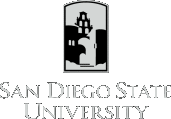Main Content
Notes and Resources...
are linked from the schedule.
Canvas LMS (Since Spring 2020)
This course will use the Canvas Learning Management System instead of Blackboard as part of an exploratory process this semester. At the end of the semester we look forward to hearing your feedback on your experience using Canvas. To access your course log in at canvas.sdsu.edu, and sign in using your SDSU ID.
Note: All Canvas notifications will be delivered to your SDSU email address. You can add additional email addresses and sign up for Text/Mobile app notifications via the settings in your Canvas Profile and then adjust your notifications in the Notifications Tab. Canvas notifications are system wide and cannot be adjusted by course. Click here to view a step-by-step guide on How to Add Additional Notification and Contact Methods.
You are responsible for adjusting your notification settings in such a way that you receive ALL announcements regarding this class.
If you have technical issues with Canvas, please contact the SDSU Canvas 24/7 support line at 619.483.0632.
Catalog description
Gaussian elimination, LU-factorizations and pivoting strategies. Direct and iterative methods for linear systems. Iterative methods for diagonalization and eigensystem computation. Tridiagonal, Hessenberg, and Householder matrices. The QR algorithm.
Prerequisites-
1.
Math 340 (Programming in Mathematics), and
-
2.1
Math 254 (Introduction to Linear Algebra), or
-
2.2
Math 342A (Methods of Applied Mathematics), or
- 2.3 Aerospace Engineering 280 (Methods of Analysis)
Computational Resources:
You must have access to a somewhat recent release of Matlab. SDSU students can download Matlab.
Students with Abilities, Seeking Success:
"If you are a student with a disability and believe you will need accommodations for this class, it is your responsibility to contact Student Ability Success Center at (619)594-6473. To avoid any delay in the receipt of your accommodations, you should contact Student Ability Success Center as soon as possible. Please note that accommodations are not retroactive, and that professors cannot provide accommodations based upon disability until they have received an accommodation letter from Student Ability Success Center. Your cooperation is appreciated."
Student Privacy and Intellectual Property:
The Family Educational Rights and Privacy Act (FERPA) mandates the protection of student information, including contact information, grades, and graded assignments. I will not post grades or leave graded assignments in public places. Students will be notified at the time of an assignment if copies of student work will be retained beyond the end of the semester or used as examples for future students or the wider public. Students maintain intellectual property rights to work products they create as part of this course unless they are formally notified otherwise.
Cheating and Plagiarism:
Students are encouraged to study together, and to work together to solve exercises. Finals, Midterms, Quizzes, Project, and other designated "individual work" activities must be completed without assistance. All violations will be reported to the Center for Student Rights and Responsibilites and will also result in score/grade reductions at the professor's discretion. Please review SDSU's full policy on academic honesty.
Religious observances:
According to the University Policy File, students should notify the instructors of affected courses of planned absences for religious observances by the end of the second week of classes.
Required Text and Reading Materials:
Numerical Linear Algebra, Lloyd N. Trefethen and David Bau, III, Society for Industrial and Applied Mathematics (SIAM), 1997. ISBN 0-89871-361-7. Note: SIAM Student Membership is (still, hopefully) FREE, which means you can get the member price!
Class web page [http://terminus.sdsu.edu/SDSU/Math543/], and handouts.
Course Outline (as of 1/20/2025):
Trefethen/Bau: I-Fundamentals: Matrix-VEctor Multiplication, Orthogonal Vectors and Matrices, Norms, The Singular Value Decomposition, More on the SVD. II-QR Factorization and Least Squares: Projectors, QR Factorization, Gram-Schmidt Orthogonalization, Householder Triangularization, Least Squares Problems. III-Conditioning and Stability: Conditioning and Condition Numbers, Floating Point Arithmetic, Stability, Stability of Householder Triangularization and Back Substitution, Conditioning of Least Squares Problems, Stability of Least Squares Algorithms. IV-System of Equations: Gaussian Elimination, Pivoting, Stability of Gaussian Elimination, Cholesky Factorization. V-Eigenvalues Eigenvalue Problems and Algorithms, Reduction to Hessenberg and Tridiagonal Form, Rayleigh Quotient, Inverse Iteration, QR Algorithm without and with Shifts, Computing the SVD. VI-Iterative Methods: Overview, Arnoldi Iteration, GMRES, ((Lanczos Iteration)), ((From Lanzcos to Gauss Quadrature)), ((Conjugate Gradients)), ((Biorthogonalization Methods)), ((Preconditioning)).
Professor
Peter Blomgren
blomgren AT sdsu DOT edu
Class hours: Asynchronous
Office hours: (Scheduling link in Canvas)
